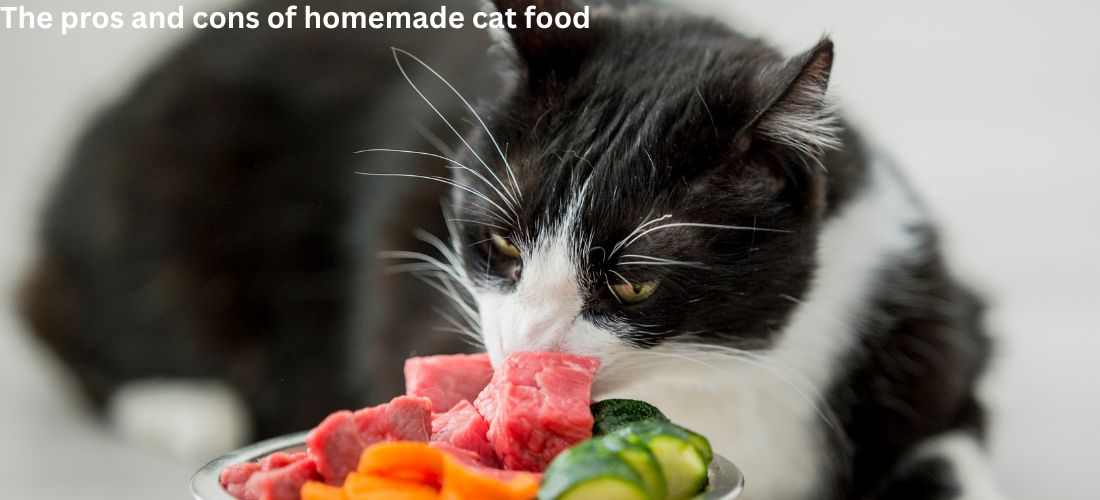The pros and cons of homemade cat food are important for anyone considering making their own cat food. While it offers potential health benefits and control over ingredients, it also involves challenges such as ensuring complete nutrition and the time needed for preparation.
Is Homemade Cat Food Better Than Commercial Diets?
Homemade cat food may seem like a healthier option compared to commercial diets, but it’s important to consult with a veterinary professional before making the switch. While homemade food for cats allows you to control what your cat is eating, it can be challenging to ensure that the diet is complete and balanced in terms of nutrients. Additionally, pet food recalls are less common with commercial cat food, which adheres to strict regulations.
On the other hand, making your own cat food allows you to feed your cat a diet free from fillers and preservatives often found in commercial pet food. Some cat owners believe that homemade cat food recipes can help with cat nutrition and prevent food allergies. Whether you choose to feed raw or cook your cat’s food at home, it’s crucial to carefully research and create a diet that meets your cat’s food needs.
Pros of Homemade Cat Food
Homemade cat food has several benefits for your feline friend. When you make homemade meals for your cat, you have control over the ingredients and can ensure your cat is getting all the nutrients your cat needs. Unlike commercial food, you can avoid fillers and additives that may not be beneficial for your cat.
Many vets recommend a homemade diet for cats due to the health benefits. Raw homemade cat food or cooked food can be tailored to your cat’s specific needs. Homemade cat food may also lead to a shinier coat, healthier weight, and better digestion compared to dry cat food or canned cat food from pet food companies.
When making your cat’s food at home, you can also introduce your cat to a variety of human food that may be more pleasing to them than traditional dry food or wet food. Plus, you can customize the raw diet based on what your cat likes and what works best for their feline health.
Overall, feeding your cat food at home can lead to healthy cats and a closer bond between you and your pet. While it may require more effort than buying commercial food, the benefits of a homemade and raw and homemade cat food diet can outweigh the convenience of store-bought food brands. Consider the long-term health of your cat when choosing the amount of food to give your cat.
Customization and Tailoring to Individual Needs
When it comes to feeding your cat, there are various options available. While store-bought cat food must meet certain nutritional standards, making cat food at home allows you to make homemade cat food that is tailored to your cat’s specific needs.
This can be especially important for kittens or adult cats with health issues. By feeding your cat homemade food, you can ensure that your cat gets the healthiest homemade diet possible. Commercial cat foods are usually safe and provide balanced nutrition for your cat. However, store-bought cat food may not always be the healthiest homemade option. Homemade cat food can be healthier for your cat as it eliminates preservatives and artificial ingredients commonly found in packaged food.
Freshness and Quality of Ingredients
Freshness and quality of ingredients play a crucial role in the overall health and well-being of your pets. Whether you’re feeding your dog or cat, opting for commercial or homemade food will give them the necessary nutrients for a balanced diet. Commercial options may be convenient, but homemade cat food provides healthy cats with the advantage of knowing exactly what they are being fed.
Healthy cats may be able to thrive on homemade raw cat food recipes for home-prepared maintenance diets. Processed cat food may not be as healthy as homemade options, as these may contain additives or fillers that are not ideal for your pet’s diet. Prioritizing freshness and quality can help your cat stay healthy and happy in the long run.
Potential Health Benefits
Commercial cat food may offer convenience, but homemade cat food can be a healthier option for your feline friend. By feeding your cat raw, healthy ingredients, you can ensure they are getting the best nutrition possible. Consider the potential health benefits of choosing homemade cat food over commercial options.
Cons of Homemade Cat Food
While some argue that raw food may be better than store-bought cat food, there are inherent risks in preparing homemade cat diets. Without the proper knowledge and resources, it can be difficult to ensure that the cat food is healthy and balanced. In addition, introducing a new food to a cat can cause digestive issues and upset stomachs.
Some believe that store-bought cat food is safe and provides all the necessary nutrients for a cat to eat. The pet food industry has invested in research to create a balanced diet for cats, whether it be kitten food or maintenance diets. While it is possible to create a homemade diet that is healthy for your cat, it can be challenging to replicate the precise balance of vitamins and minerals found in commercial cat food.
Time and Effort Required
Time and effort required to prepare homemade cat food is definitely more than simply pouring out commercial cat food. However, the benefits of having a healthy cat fed with homemade food outweigh the convenience of commercial options. Ultimately, it’s worth investing the time and effort if you truly care about what you’re feeding your cat.
Nutritional Balance and Deficiencies
Nutritional balance is crucial for a cat’s overall health and well-being. Commercial cat food is formulated to provide all the necessary nutrients, but some pet owners prefer homemade cat food to ensure their furry friend is getting the healthiest diet possible.
However, creating a nutritional balance in homemade cat food can be challenging, and deficiencies can arise if not done properly. It’s important to consult with a veterinarian or animal nutritionist to ensure that homemade cat food is meeting all of a cat’s dietary needs.
Cost and Accessibility
Cost can be a deciding factor when choosing between commercial and homemade cat food. While commercial options may be more convenient, they can also be more expensive. On the other hand, making your own homemade cat food can be more cost-effective in the long run.
When it comes to accessibility, commercial cat food is readily available at most stores. However, ensuring that your cat food is healthy and meets your cat’s specific dietary needs may be easier when making it at home. Consider your budget and your cat’s health when making this decision.
What are the benefits of homemade cat food?
Homemade cat food offers numerous benefits compared to store-bought options. Firstly, homemade cat food allows pet owners to control the quality of ingredients, ensuring a healthy and balanced diet for their feline companions. Additionally, homemade cat food can be tailored to meet specific dietary needs and preferences, resulting in happier and healthier cats.
FAQs about The pros and cons of homemade cat food
How long can you store homemade cat food?
Homemade cat food can usually be stored in the refrigerator for up to 3-4 days, compared to commercial cat food which has a longer shelf life. It’s important to store healthy homemade cat food properly in airtight containers to maintain freshness and prevent spoilage.
How to store homemade raw cat food?
Homemade cat food is a great way to ensure your cat is getting a healthy diet. When storing it, divide the food into smaller portions and freeze them in airtight containers. Thaw out each portion as needed to prevent bacterial growth. Store unused portions in the refrigerator for up to 3 days.
How much homemade cat food per day?
Homemade cat food can be a healthy alternative to store-bought options. Depending on your cat’s size and dietary needs, they may require anywhere from 1/4 to 1 cup of homemade cat food per day. It’s important to consult with a veterinarian to ensure they are getting the proper nutrients.
Can I feed my cat homemade food every day?
Homemade cat food can be a healthy alternative to store-bought options as long as it is nutritionally balanced. It’s important to consult with a veterinarian or pet nutritionist to ensure your cat is getting all the necessary nutrients in their diet.
Feeding your cat homemade food every day may require more time and effort compared to simply opening a can or bag of commercial cat food. However, many cat owners find it rewarding to know exactly what ingredients are going into their pet’s food.
Ultimately, the decision to feed your cat homemade food should be based on what works best for your pet and your lifestyle. As with any diet change, it’s important to monitor your cat’s health and consult with a professional if needed.
How can I ensure my homemade cat food is safe?
Ensuring your homemade cat food is safe requires careful attention to hygiene and nutrition. Wash your hands and tools thoroughly before preparing the food. Use high quality, fresh ingredients and follow a balanced recipe to ensure your cat food is healthy and their nutritional needs are met.
How do I prepare homemade cat food?
How do I prepare homemade cat food? Homemade cat food is a great way to ensure your feline friend is getting a healthy and balanced diet. Start by researching recipes that include essential nutrients like protein, vitamins, and minerals. Purchase high-quality ingredients and follow the recipe carefully to create a meal your cat will love.
What Are the Risks of Homemade Cat Food?
Vs homemade cat food: Commercial cat food is formulated by veterinary nutritionists to ensure a balanced diet for your feline friend. Homemade cat food may not meet all their nutritional needs, leading to deficiencies or excesses in certain nutrients.
Cat food: Without precision in measurements or knowledge of feline dietary requirements, homemade cat food can lack essential vitamins and minerals. This can result in health issues such as obesity, malnutrition, or even serious conditions like heart disease or kidney failure.
Healthy: While homemade cat food may seem like a healthier option, it’s important to consult with a veterinarian or animal nutritionist to create a balanced diet for your cat. Without proper guidance, DIY cat food recipes can do more harm than good to your pet’s health.

